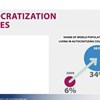before
The study pace among college students before and after a student aid reform: some Swedish results
Abstract In 2001, the Swedish system of student aid for college students was substantially reformed; the grant-share of the total aid was increased, students were allowed to earn more without a reducti
Changes in young adults' mental well-being before and during the early stage of the COVID-10 pandemic: disparities between ethnic groups in Germany
Child and Adolescent Psychiatry and Mental Health 15:69 (2021) Abstract The COVID-19 pandemic resulted in substantial disruptions to the daily lives of young people. Yet knowledge is lacking about change = 25). Respondents provided information on mental well-being (psychosomatic complaints, anxiety, depression, life satisfaction) and exposure to pandemic-related stressors (financial worries, health worries, discrimination, contact with COVID-19). Responses on mental well-being were matched to responses from two pre-pandemic waves.
John Broome
I am Emeritus White’s Professor of Moral Philosophy and Emeritus Fellow of Corpus Christi College at the University of Oxford. I am also a Visiting Professor at Stanford University, and Adjunct Profes
Interview with Erik Olin Wright
Earlier this spring, Erik Olin Wright came to Stockholm to talk at our research seminar. He spoke about pathways to a cooperative market economy. The day before, sociologist Stefan Svallfors took the
Parfit and the economists: A contribution to the debate on the optimal population size
Revue de Métaphysique et de Morale, 102, 23-37 Abstract This paper presents Derek Parfit’s contribution to the debate on the optimal population size, as it has been developed by economists. Parfit’s des
Sanja Bogojević: TBA
Sanja Bogojević is Fellow and Associate Professor of Law at Lady Margaret Hall and the Faculty of Law. Prior to joining Oxford Law Faculty, she was Associate Professor (‘Docent’) of Environmental Law More information will follow.

Anna Lührmann: Walking the Talk. Which Parties Threaten Democracy?
The recent increase of democratic declines around the world has sparked a new generation of studies on the topic. Scholars agree that these days the main threat to democracy arises from democratically
Climate Change, Historical Emissions, and Unjust Benefits: A Comment on Axel Gosseries’ Account of Climate Justice
Journal of Practical Ethics Abstract One of the claims Axel Gosseries makes in What is Intergenerational Justice? is that greenhouse gas emissions produced before 1990 are morally unimportant for presen

Petra Kosonen
I am a Postdoctoral Fellow in philosophy at Stockholm University. My research is mostly on ethics and decision theory, and the project I'm currently part of focuses on catastrophic risks. Before coming









